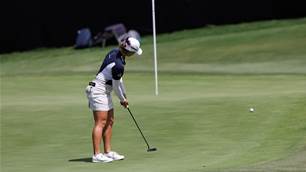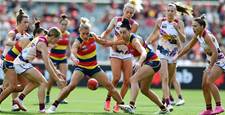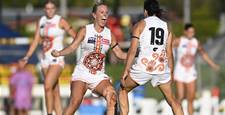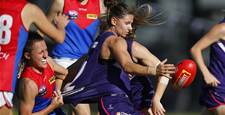Girls playing football at Football United event | TWG
 Girls playing football at Football United event | TWG
Girls playing football at Football United event | TWGFootball for All, along with "fair play", it is one of FIFA's guiding ideological principles. However since 2007, it has not been the reality for all female footballers.
On 3 March, the International Football Association Board meets in England to make determination on lifting the ban on hijabs in international football competitions.
 In 2007, FIFA's laws of the game panel outlawed the wearing of hijabs by players for safety reasons with the consequence being many Islamic women denied the opportunity to play at the highest level. The matter was highlighted last year when the table topping Iranian Women's National Team refused to remove their hijabs prior to kick-off against Jordan. The resulting forfeit, and subsequent others, saw the end of the Olympic dream for these footballers.
In 2007, FIFA's laws of the game panel outlawed the wearing of hijabs by players for safety reasons with the consequence being many Islamic women denied the opportunity to play at the highest level. The matter was highlighted last year when the table topping Iranian Women's National Team refused to remove their hijabs prior to kick-off against Jordan. The resulting forfeit, and subsequent others, saw the end of the Olympic dream for these footballers.
 Assmaah Helal is the Community Co-ordinator for Football United, a program that promotes social cohesion in urban regions through football, and has been a footballer for 15 years. Assmaah also plays for fhe UNSW Eastern Lions in the Women's Super League and can understand the frustration of the ban.
Assmaah Helal is the Community Co-ordinator for Football United, a program that promotes social cohesion in urban regions through football, and has been a footballer for 15 years. Assmaah also plays for fhe UNSW Eastern Lions in the Women's Super League and can understand the frustration of the ban.
"I've been wearing the hijab while playing for about 15 years," Helal said.
"The football association I play with (and all previous clubs/associations) have been incredibly supportive and the hijab has never been an issue. I have been selected based on my qualities as a footballer."
While wearing of the hijab during football matches is a non-issue in Australia, if Assmaah were to be selected for the Westfield Matildas, the ban on international stage would limit her ability to represent her country.
"Not being able to play the sport I love and have dedicated most of my life to (I have worked, studied and played football) would be incredibly disheartening and discouraging."
"The dream of once playing for my country would be shattered. There is no reason why my religious values cannot be combined with my love for the sport," she said passionately.
 In her role with Football United Helal also sees the positive influence football has for many migrant, refugee, indigenous and potentially at risk children.
In her role with Football United Helal also sees the positive influence football has for many migrant, refugee, indigenous and potentially at risk children.
"I have always believed football to break down barriers, to promote inclusion and provide a sense of joy and wellbeing."
"Girls from disadvantaged backgrounds not only lack financial and logistical support but some lack family and social support."
"Providing opportunities and role models for girls who generally don't have the means to play will have the confidence and support to pursue it further and work towards achieving bigger goals."
While Helal is a passionate advocate at the community level, at an international level there are some powerful advocates for the lifting on the hijab ban.
FIFA vice-president Prince Ali Bin Al Hussein of Jordan has led the campaign to alter the rules. While Asian Football Confederation acting president Zhang Jilong has written to FIFA president Sepp Blatter on the issue and the IFA's reconsideration of it's position.
"It is our beholden duty to make the game accessible to everyone across the globe and I request you to throw your weight behind this righteous cause," he stated.
Australia has also pitched it's voice with AFC Vice President Moya Dodd arguing in a recent Sydney Morning Herald article that the safety reasons are no longer viable.
''New designs … have a velcro join at the neck which will release if the headscarf is pulled, so there's no risk of medical injury and there seems to be no other reason to prevent people participating while wearing a headscarf,'' Dodd said.
In fact during the London Olympics rugby and taekwondo will allow Muslim women to wear the headscarf in competition.
While the political heavyweights will do battle, for many the impact will be felt on a smaller, yet equally significant level.
"The game would be welcoming many more elite Muslim female footballers which means more positive and competitive roles models for girls at a grassroots and domestic level," Helal aptly explained.
"The more girls and women (Muslim & Non-Muslim alike) we can encourage to participate in sport, the better our community will be. Not only at a participatory level but also in leadership positions within the sport."
"Also [if the ban were to remain] the notion of 'football for all' or FIFA's 'For the Game. For the World' would lose meaning."
"The anti-racism campaigns, and football development programs run specifically for girls around the world to enhance participation and promote self-confidence, would seem pointless."
You can lend your support and voice to the cause via many avenues:
Facebook: Lets us Play campaignInside the Games Poll
Related Articles
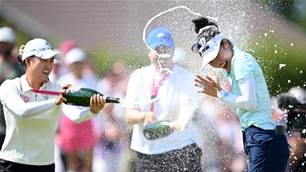
Column: Back-to-Back and Better Than Ever

The Aussies at the U.S Women’s Open
